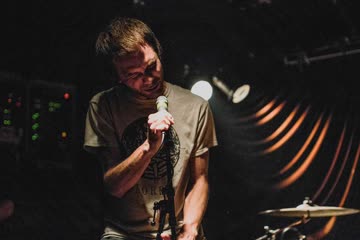Rabbit Season
"It’s a bigger, fuller sound without taking away what is at the heart of Frightened Rabbit."

More often than not, a rock band's success depends on the right intersection of songwriting and style. Rock is supposed to be cool. Rockstars are supposed to be disaffected hipsters and if they fail at it, they will struggle to cut through. Honesty, vulnerability and earnestness are anathema to the artifice and fashion that keeps Pitchfork churning. But honesty is what Frightened Rabbit do best.
Formed in Selkirk, Scotland in 2003, the band began as a bedroom project for the once chronically shy songwriter Scott Hutchison; a vehicle through which the he could exorcise the ghosts of past relationships. A year later, Grant Hutchison joined his older brother on drums, then Billy Kenny was added as a guitarist. They released a debut album, Sing The Greys, in 2006. Their follow-up, 2008's The Midnight Organ Fight was a breakthrough, a critically acclaimed work of rough bombast. Keyboardist Andy Monaghan was then added to the line-up and their sound expanded even further, captured on the 2010 album The Winter Of Mixed Drinks. Again, the record was critically acclaimed, but the not-so-cool Frightened Rabbit somehow missed the fast train to indie-rock stardom. Their literate songs of heartache and alienation never made headlines. Still, the band ploughed on. They toured mercilessly and delivered chest-rattling live performances, slowly amassing a sizeable throng of seriously devoted fans. Their rise was a slow-burn triumph of substance over style.
This year, Frightened Rabbit released their fourth long-player, Pedestrian Verse. At long last they seem to have broken through to a mass audience, with the album debuting in the UK Top 10. “We feel like the sound of this album and the songs on this album are definitely what we've been striving to achieve for years,” Grant Hutchison says. “It's a bigger, fuller sound without taking away what is at the heart of Frightened Rabbit.”
Pedestrian Verse was three years in the making, with much of it conceived and rehearsed while the band were on tour. It represents a new era for the now five-piece band (former Make Model guitarist Gordon Skene signed on in 2009), beyond their new-found commercial success. Stifled by his own attempts at songwriting, Scott Hutchison threw open the door and asked his bandmates to help him write the record. “I think he found that he was almost repeating himself,” Grant Hutchison explains. “He'd kind of maybe even subconsciously created a pattern and a routine to write a Frightened Rabbit song, and that is something that I think every band should try and avoid – rehashing old techniques and old methods to simply churn out the same old crap.” The new process was challenging for the band, requiring everyone to step up while their leader let go the reins. For the Hutchison brothers particularly, it meant keeping their sibling rivalry in check. “We've still got that little side of us that likes to show the other one up. It's funny, you know, on tour we're fine, we get along well, but creatively it can be a frustrating melting pot of emotions and, whenever one of us flies off, it's always directed at the other one. Because we're brothers, you know, that's the way it goes. We haven't physically come to blows – yet,” Hutchison laughs. Ultimately, the collaboration was successful, yielding track after track of anthemic rock, including epic singles like The Woodpile, State Hospital and the sweeping Backyard Skulls. The songs still aren't cool, but they are cannon shots of heart-on-sleeve sincerity. They have helped Frightened Rabbit reach a whole new audience.
Don't miss a beat with our FREE daily newsletter
The move from indie label Fat Cat to Atlantic Records in 2010 has also had a significant impact on the band's trajectory. “Probably the major difference with this album is that we went from a small indie label to a major. We had the usual concerns about how much input they would want, would they try and remould us into what they wanted or something that could sell records… it never happened. The word 'single' was never bandied about before we wrote and recorded the album, which is a good thing,” Hutchison says. “I think [labels] have just had to change their game plan. It's good, because I think they probably got a little bit lazy when all they had to do was throw a cheque at a band and they would become the next big thing, but even if they didn't it didn't matter because there was always more money in the bank. Now, you have to be more careful. They've given us incredible support.”
So long as they have social media, the band that built its reputation on immediacy and integrity can have the best of both worlds. “We control our Twitter and there are no label posts turning up on there, we can stay in direct contact with our fans. We were very conscious of not losing that. Our fans, who have been around for a few years, are good at smelling bullshit,” Hutchison smiles, “And if we started shovelling bullshit they would quickly disappear.”







